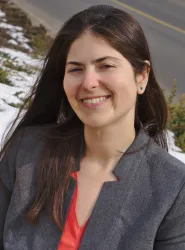
Maria G.
“It’s going to be okay. You’re going to be okay,” I say in a soft voice, allowing Meghan to grab my hand. I brace myself with my back foot as I find a position where I can support her body, which is moving uncontrollably. I hold her gently yet firmly, wondering how many times my 65-year-old mother has done this same task in the last 34 years, often on her own, even though my fully grown adult brothers can have difficulty keeping all 125 pounds of Meghan safe and uninjured during a seizure. I also wonder how long do I wait before calling an ambulance?
As her older sister, I was helping my parents respond to Meghan’s seizures ever since I can remember. Her medical issues meant school vacations spent reading quietly in hospital lounges or keeping my mother company through long ICU stays. Meghan’s diagnosis of intractable epilepsy meant medicine didn’t have a solution for her and inspired me to pursue a bachelor's degree in neuroscience. I was thrilled to receive UCB’s scholarship during my senior year in college which helped support me while I completed a senior thesis in a neuroscience lab on campus. I wanted to help find a “cure” for Meghan and to help families like ours.
As her movements become less erratic, Meghan releases my hand. I have to make a judgement call; release her too quickly and she could collapse and hurt herself. But release too slowly and she will make it clear that she is independent, thank you very much, and would you please get out of her space - now.
Contrary to the stereotyped image of the loner genius, scientists need a robust support network to do research that makes important discoveries. A strong scientific infrastructure means faster, better research that can be translated into new therapies. After receiving a masters and a PhD in neuroscience working “at the bench,” I decided to move into a career that helped support scientific discovery. I currently work to help scientists all over the world access materials to help accelerate their research. Although I believe in the importance of research, my understanding of what it means to “cure” epilepsy is now more nuanced. Finding an effective treatment for people with complicated medical histories is the ultimate of relay races where I can only run a short distance in a race that will likely take decades or longer.
I assist Meghan up the stairs, supporting us with the railing, so we don’t end up in a heap at the bottom if she suddenly loses all muscle tone. As I take off her shoes and tuck her into bed so she can sleep away her postictal headache, I speculate about how scared Meghan was. She is nonverbal but during the seizure her hands gripped mine so tightly that her nails dug painfully into my palm as if to say “please make it stop.” I calm my own frustration and sadness at how little I can do for her by reminding myself about her firecracker of a personality; she loves eating chocolate cupcakes, going for long walks, and sitting outside in a rocking chair on the porch.
In parallel with supporting scientific discovery, I have realized it is crucial to engage with public policy decisions that affect the quality of life for people like my sister. Decision makers have historically ignored or underfunded the support structures necessary for people with complex medical needs to live a dignified life. Meghan, seizures and all, should be able to live a life full of love, surrounded by people who will provide quality care for her; we all deserve nothing less, no matter our mental or physical capabilities.
